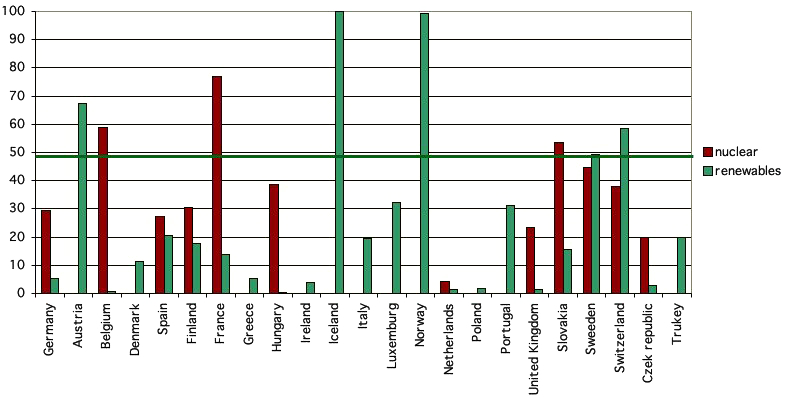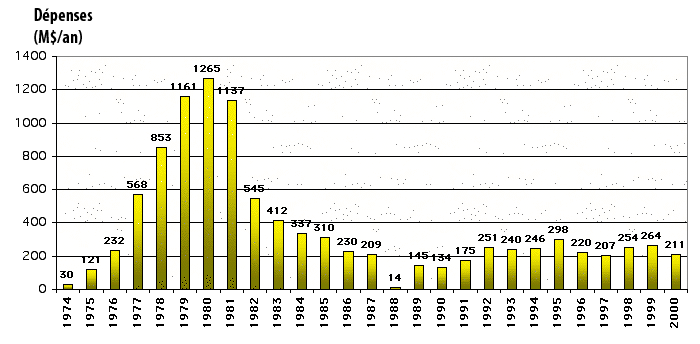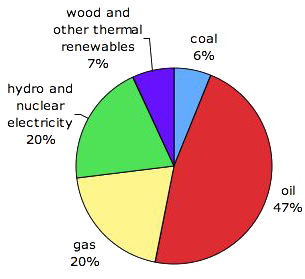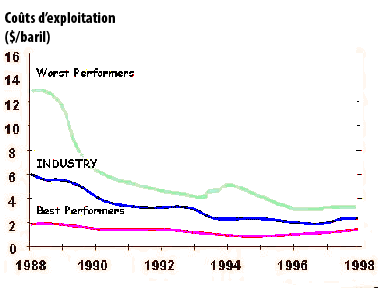European “ecologists” frequently like to think that a country that would have a large share of its electricity coming from nuclear power plants is bound to turn away from renewables energies, all the research money which is invested in nuclear energy becoming unavailable for renewables, and that this “embezzlement” prevented renewables from paying a significant part in the energy supply of the country. This argument is pretty strong in France and Germany, in particular.
If there was indeed such a correlation, one should then expect to see a very low share coming from renewables among the european countries that have a high share of nuclear electricity. What do statistics say ?

Respective shares of nuclear and renewables (in % of the country total) in the electricity production of OECD countries in 2001.
It is easy to see that Sweden, that ranks 4th regarding its share of nuclear energy in the total, ranks also 5th for the share of renewables, and that manby countries that have no nuclear energy (Denmark, Greece, Ireland, Italy, Luxenburg, Poland, Portugal, Turkey) have a much lower share of renewables than Sweden (green horizontal line), or even than France ! (Denmark, in particular, has a lower share coming from renewables than France, because there are not only windmills in renewables!).
Source : Observatoire de l’Energie.
Suppose that we now cross the Atlantic, we can observe that the US, that have less than 30% of the electricity coming from nuclear power plants, do not show the example of an intense effort in favour of renewables either !

US R&D spendings pertaining to renewable energies, in million dollars per year.
The surge that occurred after the oil shock didn’t last (and stopped before the “counter shock”, since oil prices remained very high until 1985).
Source : International Energy Agency
More generally, saying that renewables should be preferred to nuclear power is supposing :
- that renewables are “perfect” energies, non polluting, and hence much better than nuclear energy,
- that the money invested in R&D for fossil fuels (gas, oil and coal), because there is definitely some, couldn’t have reoriented to renewable energy.
On the first point, I invite the reader to look at a couple of rough figures :
- on biofuels,
- on solar energy,
- on wind power.
One will see that all renewables are far from being equivalent, and that, with the present energy consumption in France, trying to substitute nuclear energy by renewables is either impossible, or would generate disagreements far more significant (such as deforestation) than those attached to the existing nuclear power plants. Furthermore one will also see that encouraging wind power connected to the grid is probably not the good action to start with if we intend to develop renewables to diminish CO2 emissions.
On the second point, in order to allow the reader to make his own opinion, I suggest below a little calculation that I find enlighting.
What I will do is sum up, for the two major contributors to the primary energy consumption in France that nuclear and oil represent, the money spent to “prepare the future”. Indeed, the two above mentionned energies represent the two dominant – and roughly equal – contributions to the total.

Breakdown by nature of energy of the french consumption of primary energy in 2000.
Source : Observatoire de l’Energie
In both cases there is the need to invest money to “prepare for the future”.
- in the case of oil, these investments (that correspond mainly to exploration) are made by the oil companies ; the end-user will pay them indirectly through the price of oil
- in the case of nuclear energy, it can be :
- either money getting out of the federal budget, like the operating budget of the CEA,
- or research financed by private companies (Framatome or EDF) and that will be integrated into the price of electricity and are thus in fine paid by the consumer.
Let’s compare.
What do we have to pay for oil ?
- Finding costs, that is operations that are engaged BEFORE one is certain that one will find anything down the hole (sismic, wildcats, etc). It does not include development costs, when one is sure that a reservoir exists and that all it is about is putting the right pipe in the right place, even though this is not necessarily simple or totally without risks,
This upstream stage can be assimilated to R&D costs, since it is money invested to prepare for the future without being sure of what will be found. It represents 2 dollars per barrel or more.

Exploration costs in dollars per barrel.
Source : Shell, 2000
As France consumed about 100 million tonnes of oil in 2000, as a tonne of oil is worth 7,7 barrels, and as a dollar is worth about 1,1 Euro, a simple multiplication shows that the “R&D equivalent spendings” amounts to about 100*7,7*2*1,1 = 1.700 million Euros per year.
- the IFP budget, IFP being the state owned research institution on hydrocarbons in France, that amounts to 230 millions Euros per year.
- We should add a little something for the R&D budget or the refining industry, of the transportation industry, etc, that I do not know, but that are probably not dominant in front of what is above.
The overall “R&D” budget of oil that French people have to pay, under whatever form, is about 1,9 billion Euros per year
What do we have to pay for nuclear ?
For nuclear energy, we must take into account :
- The annual budgets of the CEA (state owned research facilities on nuclear energy, that has both civilian and military activities) and the IRSN (state owned facility that is in charge of research on the effects of radiation, and radioprotection), for their civilian activities : 530 million euros per year up to 2045 for the most “nuclear intensive” scenario we might have (source : Rapport Charpin Dessus Pelat). Actually if I were rigorous I should allocate this sum prorata the share of nuclear energy consumed in France (since part of the production is exported and the corresponding R&D spending is paid by the foreign consumer).
- The annual R&D budget of Cogema (the french fuel manufacturing and reprocessing company) that I cannot estimate precisely, but that is probably not above 100 million Euros for the part allocated to sales in France. Cogema has an annual turnover of 2,7 billion euros for fuel production and reprocessing, but France is far from representing the whole,
- The annual R&D budget of EDF (state owned electricity facility, that operates the totality of nuclear reactors in France) for the nuclear activities, estimated at 450 million euros at most
- The annual R&D budget of Framatome, for the nuclear activities (Framatome builds and maintains nuclear reactors), estimated from the indications given on their website at about 80 million Euros for the french sales,
The overall “R&D” budget for nuclear generated electricity thus amounts to about 1 1 billion euros per year.
As we have seen above, both oil and nuclear electricity contribute for about the same proportion to the total primary energy consumption in France (100 million tonnes oil equivalent for each one in rough figures). It is easy to deduct that, by energy unit, nuclear is about twice as cheaper in R&D costs than oil.
| Energy | Annual R&D budget | Million tonnes oil equivalent (tep) consumed in 2000 (primary) | R&D spendings per tep consumed |
|---|---|---|---|
| Oil | 1 900 | 100 | 19 |
| Nuclear | 1 000 | 90 | 11 |
Now let’s ask the top question again : which R&D money should go to renewables ?